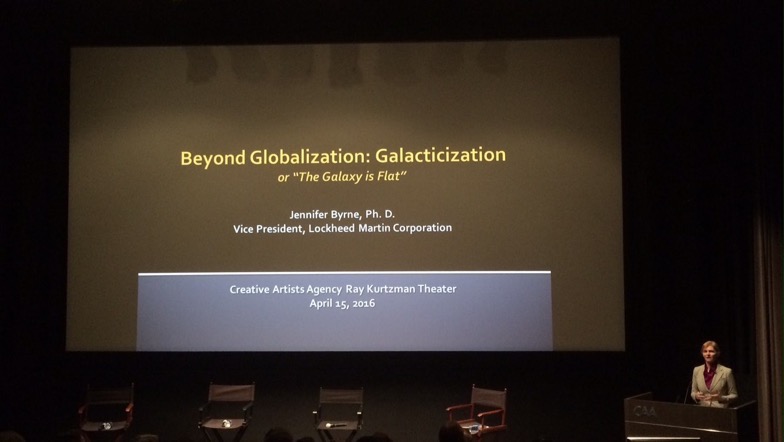K E N T M A T S U O K A

Science and the Future of Hollywood
I had the opportunity to listen to three highly respected speakers on the Future of Air and Space last night through an event organized by the Science and Entertainment Exchange, and was blown away by the importance they placed on the collaboration between Science and Entertainment that they all advocated.
The panel consisted of USAF Lt Gen Steven Kwast, president of the USAF Air University and former Military Aide to the Clinton White House; Dr Jen Byrne, Vice President, Aeronautics Technical Operations, Lockheed Martin; Dr Yvonne Cagle, NASA technical liaison and former Astronaut; and moderated by Diana Williams of the Lucasfilm Story Group (pictured from left to right in the photo above).
The conversation was filled with enlightening topics such as space colonization, quantum teleportation, and the potential difficulties of gestation in zero-g.
One of the biggest thrills for me was the reference of Thomas Friedman's 2005 book 'The World is Flat' by Jen Byrne, referencing the technological breakthroughs that enabled globalization from ubiquitous broadband connectivity and affordability of personal computers, and what technological advances we need to be to reach 'Galacticization', or the flattening of the Galaxy similar to the factors we have today that make shipping a container full of T-Shirts from China cheaper than attempting to make them here in Los Angeles.
I've talked about how globalization affects Hollywood through the ever increasing hunt to bridge financing with co-production and incentives, and referenced 'The World is Flat' myself in an interview with P3 magazine in 2011 and still believe it is relevant today, especially if we're going to talk about 'Galacticization'.
Though they differ in their politics of how to accomplish space travel, both Dr Byrne and Gen Kwast spoke at length about the importance of supply chain, communications, preservation of domestic resources, and a willingness to think outside the box and take risks.
It's easy to sit back and rest on the comforts of the status quo, to continue to do things as we've always done them before until we're left out in the cold while some newer, younger, more innovative filmmaker/country/planet develops new technology and overtakes us. We've seen it in the lesson of Kodak, which initially developed digital photography, then buried it to protect their comfortable position in photographic film technology. Likewise, Gen Kwast related a story of how Gen Pershing met with the commander of a Calvary division and asked him what his strategy would be against the recent development of mechanized armor in World War I and his response was to have the horses ride to the front in carts to keep them fresh before being deployed at the start of battle. Needless to say, Pershing in his infinite wisdom decided to do away with the calvary unit and spelled the end of horse mounted combat units in modern warfare.
Engineers and scientists are just as susceptible to resting on their laurels and disregarding new technology for fear of failure (as seen with Kodak), and the symbiotic relationship between the creative sector and science is paramount in developing and advancing technology into areas previously unthinkable.
In order to remain competitive in the world and the universe as a whole, it is absolutely imperative that not only do we as content creators promote pro-science stories to influence the next generation of scientists and engineers, but to continue looking beyond the stars and envision technology such as the handheld communicators and computers shown in Star Trek that were unimaginable in the 60's when they were introduced that are commonplace today.
Lt Gen Kwast put it best with "The marketplace of space is about to explode... we need to architect its predictability and storytellers will be crucial in that process."
In closing, while important to remember that the future of humanity lies with science and we would do well to promote it, the future of Hollywood is also tied to the lessons of science and instead of following the same formula of shooting the same scripts re-written with different characters, history has shown that if we wish to succeed as an industry, we must be willing to embrace change and if that means shooting in digital, day-and-date releases, OTT content, or simply accepting the fact that the below the line crew in Hollywood are just as much a victim of globalization as Detroit auto workers, and if you want to remain relevant, it's best to get on the boat, learn about the world around you and adapt.
Saturday, April 16, 2016


